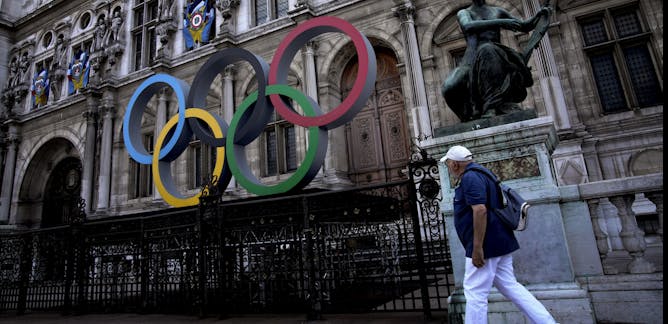|
|
|
|
The 2024 Paris Olympics kicked off on Friday, marking a return to the traditional Olympic format after the Beijing and Tokyo Games were disrupted by the COVID-19 pandemic. Fans and athletes alike are thrilled to be back in arenas and stadiums to attend Olympic events.
I am reminded of Jim Davies’s story about why we enjoy watching the Olympics so much, from the shared moments of triumph to incredible athletic feats. Canada has sent 142 repeat Olympians to the Paris Games, including renowned athletes Andre De Grasse, Penny Oleksiak and Summer McIntosh.
However, the start of the Games has not been without controversy for Canada. The head coach of the Olympic women’s soccer team was recently suspended after the team used a drone to observe the New Zealand soccer team’s training sessions. For a deeper look at the situation, check out Lianne Foti and Kathleen Rodenburg’s piece on it.
It’s also important to consider the broader context in which these Games are taking place. We are still grappling with the effects of COVID-19 and the pandemic, and a number of global conflicts. The Olympics themselves also have adverse effects on the vulnerable populations of host cities, as Umer Hussain, Adam Ali, MacIntosh Ross and Shakiba Moghadam wrote a few months ago.
As always, our team at The Conversation is working with academics across the country to bring you thoughtful, insightful articles on the Olympics. I have curated a collection of our latest stories, including pieces on the participation of transgender athletes and the treatment of environmental activists at Olympics.
We’ll be following the Paris Games closely, so be sure to stay tuned for the latest from our experts. We’ll be bringing you more updates and insights over the next few weeks.
Have a great weekend, and we’ll be back in your inbox on Monday.
|

|
Eleni Vlahiotis
Business + Economy Editor
|
|
Paris Olympics
|

Lianne Foti, University of Guelph; Kathleen Rodenburg, University of Guelph
This incident potentially impacts the nation’s international reputation and trust in Canadian athletes and raises questions about Canada’s commitment to ethical standards in sports.
| |

Jim Davies, Carleton University
From projecting onto athletes to aesthetic appreciation, spectators get a surprising amount out of watching other people play sports.
|

Umer Hussain, Wilkes University; Adam Ali, Western University; MacIntosh Ross, Western University; Shakiba Moghadam, Solent University
Sporting events like the Olympic Games claim to promote equality and human dignity, yet are frequently used to marginalize people. Perhaps it’s time to consign Olympism to the dustbin of history.
| |

Travers, Simon Fraser University
While transgender people have gained some recognition and human rights in the past decade, a well-financed reactionary movement is rolling them back.
|

Adam Ali, Western University; jay johnson, University of Manitoba; MacIntosh Ross, Western University
Despite the IOC’s optimistic rhetoric, environmental exploitation by host nations, and the suppression of opposition to such exploitation, have remained a troubling feature of the Olympic Games.
| |

Jenna Schulz, Western University; Jane Thornton, Western University
While there has been large advances and successes for athlete-mothers and progress since the 2020 Tokyo Olympics, there is still work to be done to improve postpartum care and support.
|

Vaughan Cruickshank, University of Tasmania; Brendon Hyndman, Charles Sturt University
Between hammers in trees, uneven fields, audience members joining teams and post-humous recognition for winners, the 1900 Paris games left much to be desired. Luckily, 1924 made up for it.
| |

Keith Rathbone, Macquarie University
As the world’s attention turns to Paris, the French capital is under its strongest-ever security regime ahead of the Olympics.
|
|
|
Jasper wildfire
|

A wildfire burns as an empty street in Jasper, Alta. is shown in this July 24, 2024 handout photo from the Jasper National Park Facebook page.
(THE CANADIAN PRESS/Facebook, Jasper National Park)
Stephanie Cleland, Simon Fraser University; Ryan W. Allen, Simon Fraser University
As communities are exposed to wildfire smoke more regularly and over longer durations year after year, it is critical to consider what these changing exposure patterns mean for our long-term health.
|

Fire equipment lines a side street in Hinton, Alta., on July 25, 2024. Wildfires encroaching on the townsite of Jasper forced an evacuation.
THE CANADIAN PRESS/Amber Bracken
Eric B. Kennedy, York University, Canada
Containing and extinguishing mega blazes like the one that reached Jasper is an all-hands-on-deck affair that draws upon expertise from around the world.
|
|
|
| |
| |
| |

|
| |
| |
| |
| |
| |
| |
|
|
|
|
|
|
|